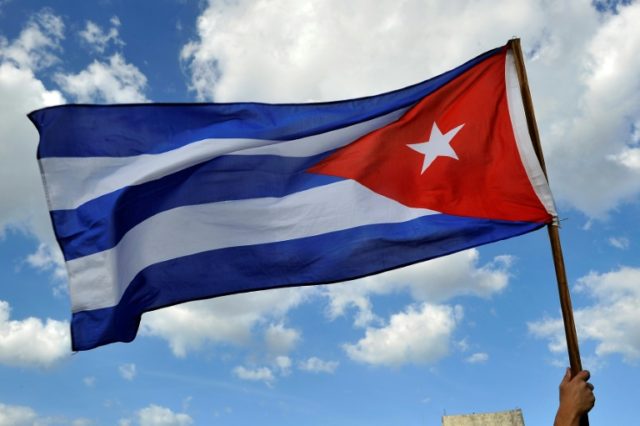The communist regime running Cuba protested on Thursday to allegedly having its diplomats blocked from receiving visas to work at the Cuban embassy in Washington or the United Nations. The Trump administration limited the number of Cuban agents in the U.S. following the sudden unexplained illness of American diplomats in Havana.
Cuban state media contends, however, that the visa rejections extend beyond the original limits on the number of staff at the Cuban embassy, which the State Department cut down to balance the withdrawal of non-essential American personnel at the U.S. embassy. The alleged visa limitations, which the State Department neither confirmed nor denied, occur little more than a month after Cuban regime agitators nearly forced the shutdown of a United Nations event on human rights by shouting over fellow diplomats and banging on tables for the duration of the entire event.
Intelligence experts have long warned that allowing Cuban diplomats to operate within American borders enables Cuban state security to conduct extensive espionage operations on the U.S. government, collecting intelligence it can sell to allies like China, North Korea, and Russia.
“After two decades of Cuba not denying a single visa to the United States, the United States has stopped replying to several requests for visas for our personnel, who not only work to improve relations between Cuba and the United States, but tend to Cuban migration issues and to businessmen who visit us,” Johana Tablada of the Cuban foreign ministry told the Associated Press (AP). Cuba bans almost all migration to the United States, forcing thousands to risk their lives on makeshift maritime vessels in the Caribbean, and strictly limits foreign business on the island, leaving open the question of what sorts of services the blocked diplomats are allegedly providing. Tablada cited only six instances of the State Department rejecting a visa request.
This did not stop Cuban state media from publishing attacks on Washington on Thursday and Friday.
“Since his arrival in the White House on January 2017, Trump has kickstarted actions clearly promoting his declared goal of reverting the progress occurring in 2015 and 2016 in bilateral ties,” the state-run Prensa Latina objected.
Granma, the official newspaper of the Communist Party of Cuba, accused Trump of launching a “campaign to discredit Cuba and seek new excuses to hinder relations between the two countries.”
While the official Cuban state outlets did not specify visas to New York, a reporter questioned State Department deputy spokesman Robert Palladino on the topic on Thursday, citing Cuban sources who complained the U.S. also denied them visas to New York, claiming, “they’re also complaining that you guys are denying visas for Cuban officials to come to go to New York or to participate in UN events.”
“The Cuban Government is already aware of our concerns about visas, specifically about staffing at our embassy in Havana,” Palladino replied. “Under reduced staffing levels at the United States embassy in Havana following the health attacks, every position is vital to our operations, and both of our governments are – maintain our sovereign right to issue or deny visas to specific individuals.”
Palladino did not offer a specific response on the U.N. visas, which would fall under a different legal category than those for Washington.
The visa dispute arises amid two ongoing controversies surrounding Cuban diplomats: the attacks on American and Canadian officials working in Havana and the decision by a Cuban delegation at the U.N. to prevent the peaceful completion of a U.N. event on human rights by having a mob of alleged diplomats drown out the event with noise for its entire duration.
The United States has confirmed at least 26 cases of diplomats and their families working out of the American embassy in Havana suffering brain trauma after hearing loud, shrill noises in their homes. While American medical experts have confirmed that the victims suffered real physical damage – and are not suffering from mental illness or mass hysteria – they have yet to find the source of the crime. The U.S. has confirmed a similar case in China.
Canada has confirmed 13 cases of similar brain injury, prompting some confusion as, unlike the U.S., Canada enjoys friendly ties with the United States. The Canadian government confirmed its latest case on Thursday, announcing that it is “reconsidering” having a diplomatic presence in the country.
“It’s difficult to speculate even on the breadth of the options that are out there,” an unnamed senior Canadian official told the nation’s CTV.
The Cuban regime has not acknowledged the Canadian victims. In a government-produced “documentary” on the American victims, however, Havana asserted that its scientists had definitively concluded that the diplomats did not suffer any physical harm, but were instead alarmed by the sounds of insects common in Havana that may not be present in parts of the United States. Cuban Foreign Minister Bruno Rodríguez called the attacks “science fiction.”
At the U.N., Cuban representatives have increased their belligerent behavior, possibly prompting a reconsideration on whether to allow them in the country. Last month, the U.N. hosted an event called “Jailed for What?” highlighting the abuses against political prisoners in Cuba, particularly the head of the Christian Liberation Movement (MCL), Eduardo Cardet, who police arrested in 2016 for allegedly failing to sign a condolence book to Fidel Castro. The Cuban diplomats present, along with some officials from allied leftist states, proceeded to shout angrily throughout the entire event, bang on tables, and otherwise cause disturbances to prevent the public from hearing the event’s speakers.
“I have never in my life seen diplomats behave the way that the Cuban delegation did today,” U.S. Ambassador for the U.N.’s Economic and Social Affairs Kelley Currie said at the time. “You can understand very well why people feel afraid to speak their minds … with this kind of government, this kind of thuggish behavior.”

COMMENTS
Please let us know if you're having issues with commenting.